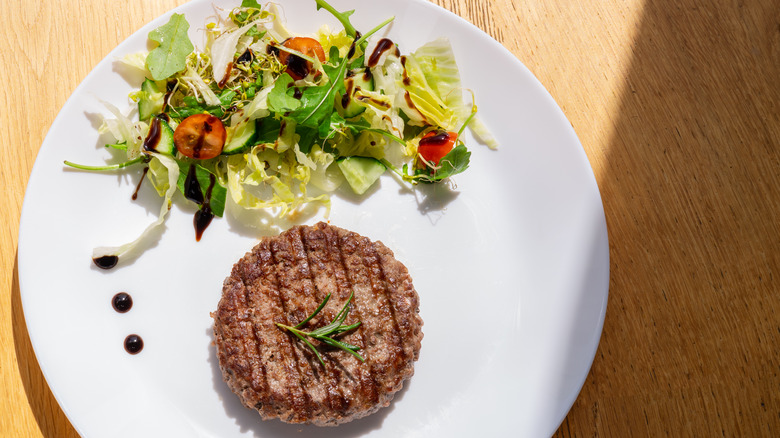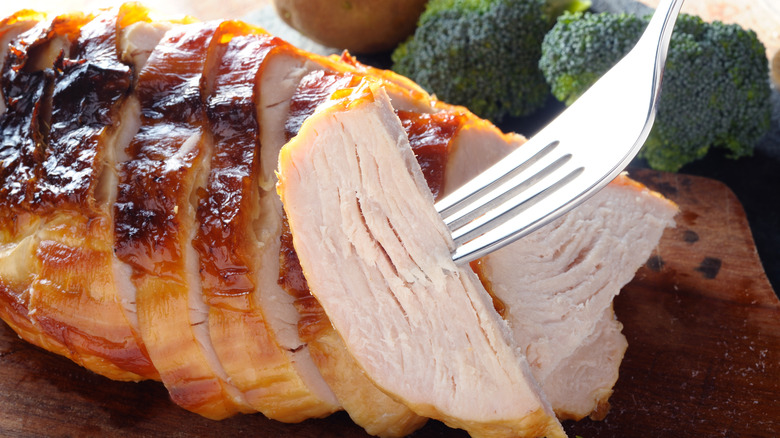The Healthiest Meats You Can Eat For Breakfast
Each of us have a certain preference when it comes to breakfast meals. Whether you're a fan of breakfast foods that healthy people eat or you've grown up consuming cereals with lots of added sugar in them, it's often difficult to break the habit of your go-to choices come morning.
Added to this picture is the undeniable allure of certain classically popular breakfast meat options. We're talking bacon, sausages, ham, and other ultra-processed meats. No matter how tasty they are, experts generally recommend either limiting or avoiding the consumption of them. As described by clinical dietitian, Regina Shvets of Sibley Memorial Hospital (via Johns Hopkins Medicine), the reason why such highly processed meats are bad for you has to do with what's in them. "Many are loaded with preservatives to make them shelf stable, as well as sodium, nitrosamines, and synthetic food dyes. They can also be high in saturated fats. It's best to eat these breakfast meats occasionally and in small amounts," the nutrition specialist explained.
That being said, not all meat needs to leave your breakfast table. In fact, there are some that can actually help you start your day on the right foot. Consuming meats like lean beef, ground pork, and turkey can give you a good dose of protein first thing in the morning. From helping boost your metabolism to promoting weight loss, there are plenty of reasons to add these foods to your plate. Let's take a look at some healthy breakfast meats.
Chicken has a high protein content
Starting your day off with a good serving of protein can go a long way. And while all meats are a good source of this macronutrient, chicken takes the cake in the department, particularly chicken breast.
You'll be giving your body a bountiful supply of an essential nutrient that is often referred to as the building block of your system. Protein is responsible for fueling your body and giving you energy, supporting your immune system health, building and maintaining muscle mass, boosting your metabolism, maintaining the health of your nails, hair, and skin, and also keeping your blood sugar levels in check. As shared by a registered dietitian at Henry Ford Health, Allegra Picano, "After a high-protein breakfast, your blood sugar can remain low for up to four hours."
Plus, a protein-rich meal means you are ensuring a satiating start to your day. For people who are focused on weight management, this could mean less cravings till lunchtime. Plus, chicken is low in calories and contains other beneficial nutrients like niacin, selenium, phosphorous, vitamin B6, vitamin B12, riboflavin, zinc, thiamine, potassium, and copper. It is imperative, however, to be aware of the unhealthy mistakes you might be making when cooking chicken. Turning to fried, breaded, or processed varieties might defeat the purpose of starting your day off right. Opt for grilled chicken options instead.
Lean beef is a good breakfast option
Lean cuts of beef, including options like eye of round roast beef, tenderloin steak, top sirloin steak, and lean ground beef are healthy breakfast options. Ground beef is perfect for those times when you want to add some to a healthy salad or burrito. It also helps that they can be transformed into convenient breakfast patties.
Again, this is another type of meat that has the most protein per gram. In addition to protein, however, lean beef is a rich source of vitamin B12. "Vitamin B12 is critical for metabolism and is predominantly found in animal-based foods," offered registered dietician, Kris Sollid, per Eating Well. Your heart, nerve, brain, and muscle health can also benefit from vitamin B12.
Other beneficial vitamins and minerals found in lean beef include vitamin B6, zinc, selenium, iron, niacin, and phosphorous. Zinc and iron, in particular, are found in rich quantities. While the mineral zinc is associated with wound healing, a healthy immune system, and your metabolism, iron is responsible for your body's growth, hemoglobin production, and immune system health. There's more when it comes to foods you should eat and avoid for breakfast.
Turkey is a healthy breakfast food
One of the most debated topics when it comes to meat consumption is its saturated fat content. In fact, this is why eating red meat every day is discouraged. Although science hasn't fully understood (or agreed upon) the effects of dietary saturated fat and how it might affect your heart, the prevailing advice is to avoid or at least limit its intake.
This is why turkey might be a great option. Beef and pork typically contain more saturated fat than turkey. As explained by a professor of nutritional epidemiology and dietary assessment and nutrition counseling at Louisiana State University's Pennington Biomedical Research Center, Catherine M. Champagne (via American Heart Association), "Turkey is a great source of protein, rich in many vitamins and minerals, and is low-fat — if you don't eat the skin."
In addition to all the other nutrients animal protein contains, like iron, magnesium, zinc, vitamin B12, vitamin B6, selenium, potassium, phosphorous, and niacin, turkey also has the added advantage of choline. Choline is a compound that has been linked with mood and memory regulation, muscle control, cell structure maintenance and communication, cholesterol removal from your liver, DNA synthesis, and a well-functioning nervous system. Again, it is important to avoid the ultra-processed kinds and go for low-fat ground turkey or turkey breast.
Salmon is perfect for the morning
Depending on whom you ask, fish may or may not qualify for a list of meat options. However, since it comes from an animal, we're going to add it to the list of healthy meats you can have for breakfast.
Fish is known for its protein content too — 100 grams of raw Atlantic salmon contains as much as 20.4 grams of protein. However, this type of fish also has omega-3 fatty acids, vitamins, selenium, phosphorous, potassium, iodine, choline, and biotin. Omega-3 fatty acids have been linked with improving heart health, preventing the development of certain cancers, lowering your risk of neurodegenerative diseases like dementia, and reducing the chances of age-related macular degeneration (AMD). What's more, the B vitamins in this fish make it an ideal meat to have for breakfast if you want to cure a hangover.
The mineral iodine can help promote thyroid health, and cognitive and neurodevelopment of children still in the womb. Biotin performs a lot of essential roles in your body too, like transforming macronutrients into fuel for your system and preventing hair loss. Experts generally don't discriminate between the wild, farmed, or canned variety of fish. If you're thinking about mercury content, however, salmon is one of the best choices when it comes to low-mercury content.
Ground or lean pork is packed with nutrients
Unlike the fat-heavy and processed bacon or sausages, low-sodium ground pork or lean cuts of the same meat can be safely added to your breakfast table. Apart from being a good source of protein, pork contains other beneficial nutrients like potassium, choline, niacin, vitamin B6, vitamin B12, iron, and zinc. Much like with other sources of meat on this breakfast foods list, pork is also linked to muscle development and maintenance, blood cell health, brain function, boosting energy, and immune system health.
Preparing these meat varieties for breakfast, however, can take up more of your time, with the exception of salmon, of course. It may help to prep your meals the night before so you can throw them in a pan or grill come morning. Something else that should be said about breakfast is that it should be a balanced meal. While protein is important, you can also add whole grains, vegetables, and fruits to your plate to round things off. Particularly, in the case of red meats, it is important to take into account your entire diet when adding these foods to your morning meal, per registered dietician and professor of preventative medicine at Northwestern University, Linda Van Horn (via Men's Journal). "Choose fresh, lean cuts and stick to a 3- to 5-ounce serving no more than four times a week," added the expert.





